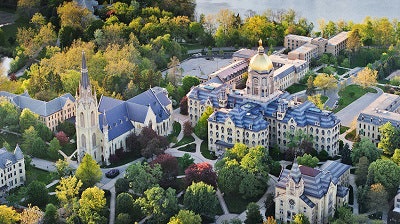When Don Wycliff came to the University of Notre Dame as a freshman in 1965, he was a part of a close-knit group of Black students. His first two years were hard, but he settled in, “learned the ropes academically” and ultimately enjoyed himself.
“On the whole, it was a very good time. I made some enduring friendships, and I’m glad I did it,” said Wycliff, now the Keifer Distinguished Visiting Journalist at the University of Notre Dame. At the same time, “I’d be lying if I said, during my four years, I never heard the n-word. I’d be lying if I said I didn’t feel lonely. We were a small group of Black students, and we kind of pulled together and made our mark.”
The university’s alumni association is reckoning with experiences like Wycliff’s through a communal reading of a book he co-edited with David Krashna, a fellow Black alumni and Alameda County California Superior Court judge. It’s called “Black Domers: African-American Students at Notre Dame in Their Own Words.” First published in 2014, the book of 75 first-person essays explores the experiences of Notre Dame’s Black students over the course of seven decades, starting with its first Black graduate in 1947.
Over the course of seven weeks – Oct. 5 through Nov. 22 – the University of Notre Dame Alumni Association’s affinity groups will be taking turns moderating online discussions, covering a decade of Notre Dame Black student history per week on the designated Facebook page.
After Black Lives Matter protests this summer, the goal of the shared read program is to take an “intimate” look at Notre Dame’s campus climate for Black students over time, as a “critical first step” toward long-lasting change, said Angeline Johnson, affinity programs director at the University of Notre Dame Alumni Association. “There are so many great resources out there, available globally and nationally, on issues of racial injustice, but this book was so valuable specifically to the Notre Dame family. We were hoping that it would help to open our eyes to the stories of our Notre Dame brothers and sisters and understand what their lived experience was like on campus.”
As a part of the shared read, members of the Notre Dame alumni community are encouraged to host their own conversations through their local Notre Dame clubs, either virtually or in-person. To aid that effort, there’s an accompanying online platform that’ll carry historical context for the readings and video interviews with writers and editors. Affinity groups also worked together on a reading guide with discussion tips and decade-specific sample questions.
“We’re trying to make it as easy as possible for people to plug into this,” Johnson said.
Notre Dame Women Connect, one of the alumni association affinity groups, has had a shared read program for about five years, so the format is “capitalizing on something that already existed and really utilizing it in this new way,” Johnson added. For her, part of the strength of the program is that all eight affinity groups are collaborating.
“It’ll bring lots of different perspectives to the table through that moderation,” she said, “and it’ll bring lots of experiences to the table, as well.”
In the book editing process, Wycliff saw echoes of his own campus experience across generations of students. He came across some major themes: the importance of diverse university leadership to Black students, their strong sense of university pride and their connection to South Bend, Indiana’s broader Black community.
During his own years in school, “it was an isolating time and we did what we had to do to manage it,” he said. “The importance of the Black community in South Bend cannot be overstated. Those people just welcomed us into their homes, fed us; we dated their daughters. It was all very important. Crucial, actually.”
Through the shared read, he hopes White members of the broader Notre Dame community will have an opportunity to immerse themselves in experiences of campus life different from their own.
“Part of the purpose of college I’ve always thought is to encounter people unlike yourself and to learn how they look at life and to put yourself in their place,” he said. “Even today, I suspect there are lots of White students who can go through and never encounter a Black student in a classroom or other setting. And that’s not good. So, I hope people, by reading these stories, get a sense of how one another look at their Notre Dame experience, look at their life experience. That’s critically important.”
The book – and the communal reading – can also connect and empower Black students and alumni. Wycliff, described the book as “cultural capitol we can give our kids.”
“Black students can realize they’re not alone,” he said. “They’re not doing something radically new. There are others who walked this path before them and made it.”
Sara Weissman can be reached at [email protected].















